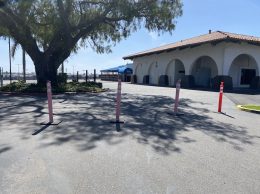The Obama Administration has achieved an important milestone in getting a general agreement on the Trans-Pacific Partnership.
The TPP involves roughly 40 percent of the global economy and includes most of Asia except China. It lowers tariffs, reduces informal barriers that get in the way of U.S. exports of services and adds new protections for intellectual property. In the long run, it means new opportunities for California and the Central Coast.
The TPP still needs approval from Congress and it will be a tough sell in Canada, where unpopular Prime Minister Stephen Harper faces a spirited opposition that has staked out an anti-TPP stance.
But, ultimately, the TPP is about expanding trade in ways that will benefit the Tri-Counties. Here’s why:
• By reducing tariffs on agricultural products, the Central Coast’s specialized growers will find new markets in Asia for citrus, berries, wine and many other products.
• The Port of Hueneme will instantly become a more competitive destination for both imports and exports, particularly for agricultural products and automobiles. The port is a huge potential future driver for the Ventura County economy and it is heavily dependent on trans-Pacific trade already.
• Foreign direct investment is a key driver for capital in our region. The TPP will allow expanded investment in technology, real estate and traditional businesses in the Tri-Counties. Moreover, capital imports from Japan and other TPP countries will serve as a counterweight to Chinese investment.
• Because China is not part of the accord, the TPP will offer countries ranging from Chile to New Zealand an opportunity to increase their trade. As China shifts gears to slower growth, increased growth in the rest of Asia will help balance the global economy.
• This is not just about Asia. Mexico, Peru, Canada and Chile are all partners in the agreement, along with Singapore, Australia, Vietnam and tiny Brunei.
Like all trade accords, the TPP is not perfect. Labor will decry the lack of protection for workers and the far left will see it as a business giveaway.
But trans-border trade has proven to be one of the biggest ways that the world’s poor can have the opportunity to develop a sustainable lifestyle. The TPP holds out hope for increased capital flows and new markets for Central Coast companies.
Haggen finds buyers for stores
Haggen has already lined up buyers for 10 of the 23 grocery stores it plans to close in the Tri-Counties as part of a Chapter 11 bankruptcy.
Gelson’s Markets is targeting a location in Thousand Oaks and Smart & Final plans to take over nine stores in Atascadero, Carpinteria, Newbury Park, Paso Robles, San Luis Obispo, Santa Barbara, Simi Valley, Ventura and Westlake Village.
That means a crisis has been averted for some shopping centers that faced the prospect of losing an anchor tenant and the foot traffic that goes with it.
We hope the bankruptcy court allows the 10 tri-county stores to be sold and that buyers can be found for the other 13 stores as soon as possible so Haggen’s exit has minimal impact on our economy.






 Print
Print Email
Email

















